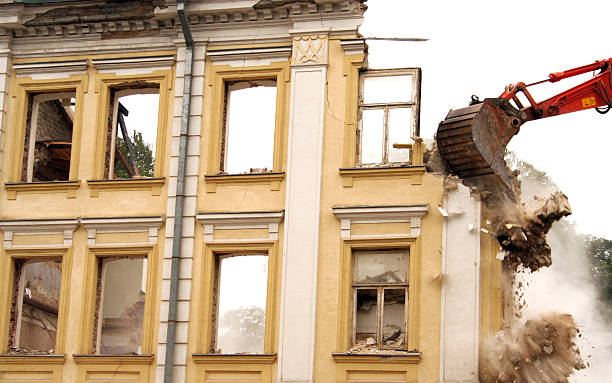In urban planning law, understanding the statute of limitations for urban planning infractions is crucial, especially in a region like the Balearic Islands, where the legal framework is stringent to protect the natural and urban environment.
As experts in urban planning and construction law, at Rodríguez Tur Abogados, we recognize that urban planning infractions can have severe consequences, not only in terms of financial penalties but also due to the possibility that authorities may require the demolition of illegal buildings. In this article, we will analyze in detail the statute of limitations, the different types of violations, and how urban legality can be restored in the Balearic Islands.
What is the Statute of Limitations for Urban Planning infractions?
The statute of limitations for an urban planning infractions refers to the period during which the administration has the authority to sanction illegal conduct related to land use and development. Once this period has passed without a sanctioning or legal restoration procedure being initiated, the infraction expires, meaning it can no longer be subject to administrative penalty.
However, it is essential to note that expiration does not always mean the works are legalized. In some cases, even if the penalty has expired, authorities may still require the demolition of the construction or the restoration of the land to its original state, particularly if it involves protected rural land or areas listed for their historical or cultural value.
Statute of Limitations for Urban Planning infractions in the Balearic Islands
The regulations governing the statute of limitations in the Balearic Islands are established by the Urban Planning Law of the Balearic Islands (LUIB). This law clearly defines the time limits depending on the type of violation:
- Minor infractions: Expire after one year.
- Serious and very serious infractions: Expire after eight years.
When Does the Statute of Limitations Begin?
The statute of limitations begins from the date the illegal work is completed or, in the case of changes in land use, from the moment the unauthorized new use starts.
To invoke the statute of limitations, the violator must be able to provide clear evidence of the completion date through objective evidence, such as aerial photos, expert reports, invoices, or any other means that unequivocally demonstrate that the required time has passed for the violation to have expired.
Exceptions to the Statute of Limitations: Protected Rural Land and Listed Cultural Assets
Although the general statute of limitations is 1 year for minor violations and 8 years for serious and very serious ones, there are important exceptions. The LUIB establishes that the administration’s power to demand the restoration of urban legality never expires in the following cases:
- Urban subdivision on rural land.
- Acts or works on protected rural land.
- Illegal constructions or uses on properties listed for their cultural, historical, or natural value, such as parks, gardens, public infrastructure, or areas reserved for public amenities.
In these cases, authorities have the right to order the demolition of the illegal works and demand the restoration of the land to its previous state at any time, regardless of how many years have passed since the violation occurred.
When Does an Urban Planning infraction Expire in the Balearic Islands?
To determine when an urban planning infraction expires in the Balearic Islands, it is essential to differentiate between minor, serious, and very serious violations. As mentioned earlier, the time limit is 1 year for minor violations and 8 years for serious or very serious infractions.
It is crucial to work with a lawyer specialized in urban planning who can guide you through this process, especially if there are doubts about the statute of limitations or if the infraction affects protected areas or cultural assets, where legal restoration measures do not expire.
When Does Construction Without a Permit from the Town Hall Expire?
One of the most common infractions is carrying out works without the proper permit from the Town Hall. This type of infraction is considered serious if the works involve a change in land use or significantly alter urban planning. The statute of limitations for this type of construction, as with other serious violations, is eight years. If the administration does not initiate a sanctioning procedure within this time frame, the violation will expire, although this does not guarantee that the work can be legalized.
In any case, it is essential to remember that the statute of limitations does not imply the automatic legalization of the work. Even if the infraction has expired, it may still be necessary to initiate a regularization process with urban planning authorities to obtain the required permit.
What is an Urban Planning Discipline File?
An urban planning discipline file is the administrative procedure that the authorities initiate when they detect a possible urban planning infraction. This procedure has two objectives:
- Determine the infraction and, if applicable, impose a penalty.
- Restore urban legality, which may include the demolition of illegal works or the restoration of the land.
The sanctioning procedure can be triggered by a citizen complaint, an inspection initiated by the authorities, or other urban planning control mechanisms. Once the violator is notified, they are given a period to present their case and, if possible, remedy the infraction by legalizing the work, if feasible.
Expiration of the Sanctioning File
The sanctioning file has a time limit for resolution. Under current Balearic regulations, the file must be resolved within a maximum of 18 months. If the administration has not issued a resolution within this period, the file expires, and the corresponding sanction cannot be imposed. However, the expiration of the file does not mean that the illegal work is legalized, nor does it eliminate the obligation to restore legality if the construction is in protected or listed areas.
What Happens if You Are Discovered Building Without a Permit?

If you are caught carrying out construction without a permit and the authorities detect it, the most likely outcome is that the works will be immediately halted, and a sanctioning file will be opened. Penalties for this type of infraction are usually significant, with fines ranging from 50% to 250% of the value of the works.
Additionally, if the construction cannot be legalized, demolition of the building will be ordered.
In this scenario, it is crucial to act quickly and seek specialized legal advice to attempt to rectify the infraction or explore other legal avenues to minimize the consequences.
How to Avoid an Urban Planning infraction tion in the Balearic Islands?
The best way to avoid sanctions and legal issues arising from urban planning infractions is to proceed with caution and ensure that you have all the necessary permits and licenses before starting any work. Key recommendations include:
- Consulting the urban planning regulations before purchasing land or starting a project.
- Applying for the necessary permits from the Town Hall and ensuring that the works comply with local regulations.
- Hiring qualified professionals, such as architects or surveyors, to ensure the project meets all current regulations.
- Verifying the legal status of the property before purchasing, especially in rural or protected areas, where restrictions are often stricter.
At Rodríguez Tur Abogados, we specialize in urban planning law and have a team of professionals who can help you prevent penalties, manage sanctioning procedures, and restore urban legality. Contact us for personalized advice and to avoid legal problems that could affect both your property and your investment.




